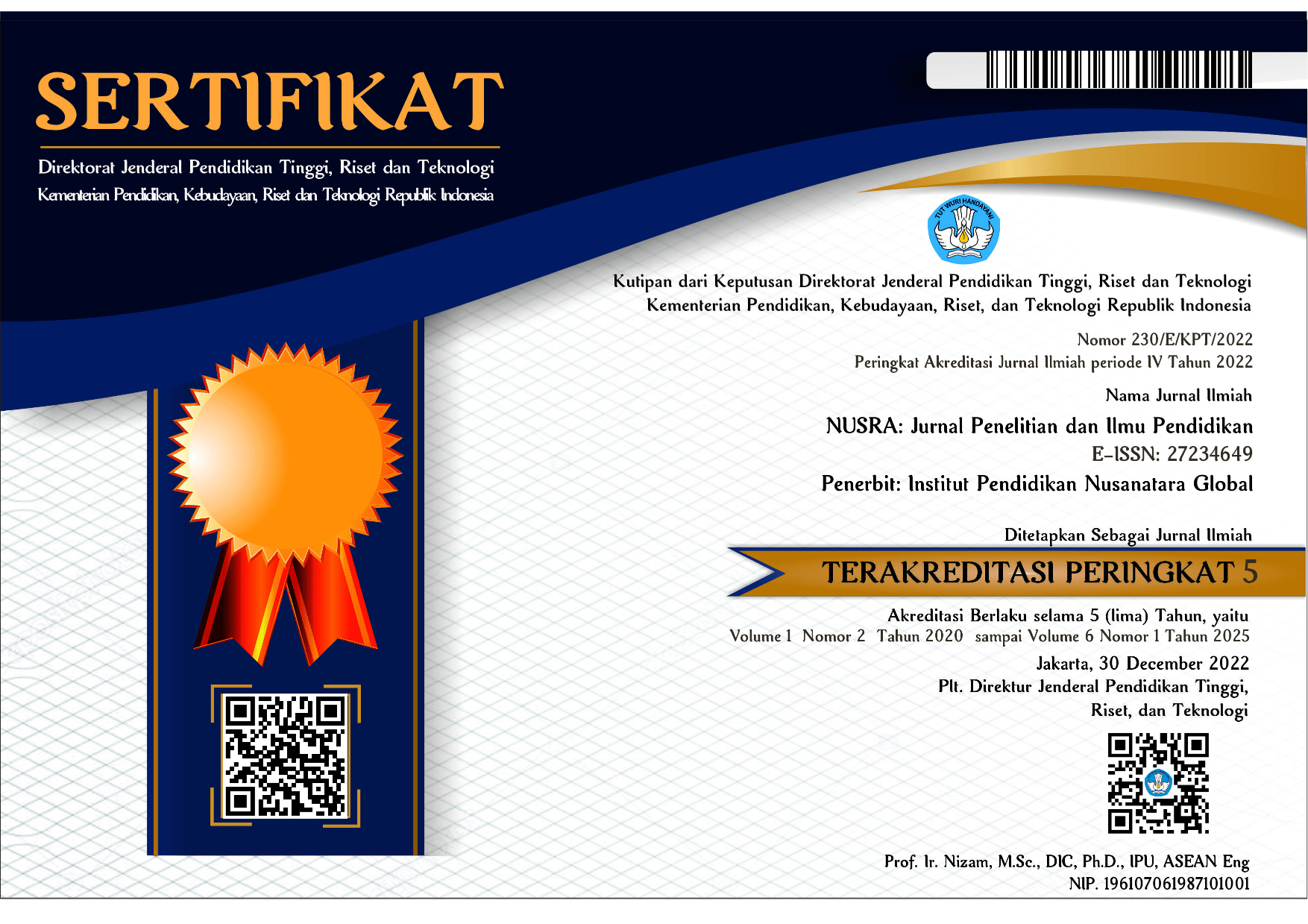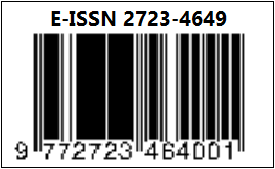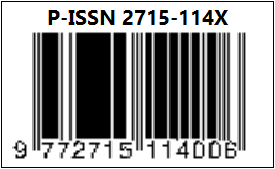Students' Lived Experiences in Utilizing Artificial Intelligence for Thesis Writing
DOI:
https://doi.org/10.55681/nusra.v5i2.2696Keywords:
Artificial Intelligence, Academic Writing, Thesis Writing, Lived ExperiencesAbstract
This research report investigates students' experiences using Artificial Intelligence (AI) in the thesis writing process. Data collection was carried out by means of in-depth interviews with 6 undergraduate students at Sanata Dharma University. Transcendental phenomenology was used in this research to dig deeper into how they interacted with AI and how AI influenced their thesis writing process. This research displays three emerging themes:1) AI improved students' motivation in writing a thesis, 2) AI fosters decision-making to solve problems, 3) AI promotes students’ self-confidence and shifting attitudes. This research contributes to understanding how the use of AI affects students' experiences and their thesis writing process. Further research is needed to understand the long-term impact of using AI in the thesis writing process and higher education as a whole.
Downloads
References
Ahmad, S. F., Han, H., Alam, M. M., Rehmat, M., Irshad, M., Arraño-Muñoz, M., & Ariza-Montes, A. (2023). Impact of artificial intelligence on human loss in decision making, laziness and safety in education. Humanities and Social Sciences Communications, 10(1), 1-14.
Aldabbus, S., & Almansouri, E. (2022). Academic writing difficulties encountered by university EFL learners. British journal of English linguistics, 10(3), 1-11.
Alkaissi, H., & McFarlane, S. I. (2023). Artificial hallucinations in ChatGPT: implications in scientific writing. Cureus, 15(2).
Alzahrani, L. (2023). Analyzing Students’ Attitudes and Behavior Toward Artificial Intelligence Technologies in Higher Education. International Journal of Recent Technology and Engineering (IJRTE), 11(6), 65-73.
Andrade, C. (2021). The Inconvenient Truth About Convenience and Purposive Samples. Indian Journal of Psychological Medicine, 43(1), 86–88.
Badil, Muhammad, D. M., Aslam, Z. A., Khan, K. K., Ashiq, A. A., & Bibi, U. B. (2023). Phenomenology qualitative research inquiry: A review paper. Pakistan Journal of Health Sciences, 09–13.
Burkhard, M. (2022). Student Perceptions of AI-Powered Writing Tools: Towards Individualized Teaching Strategies. International Association for Development of the Information Society.
Chiu, T. K., Xia, Q., Zhou, X., Chai, C. S., & Cheng, M. (2023). Systematic literature review on opportunities, challenges, and future research recommendations of artificial intelligence in education. Computers and Education: Artificial Intelligence, 4, 100118.
Creswell, J. W., & Creswell, J. D. (2017). Research design: Qualitative, quantitative, and mixed methods approaches. Sage publications.
Dwihandini, L. A., Marhaeni, A. N., & Suarnajaya, I. W. (2013). The Analysis of the Factors Affecting Undergraduate Students’ Difficulties in Writing Thesis in the English Department of Mahasaraswati University. Jurnal pendidikan dan pembelajaran Bahasa Indonesia, 2.
Elhami, A., & Khoshnevisan, B. (2022). Conducting an Interview in Qualitative Research: The Modus Operandi. Mextesol Journal, 46(1), 1-7.
Farrell, E. (2020). Researching lived experience in education: Misunderstood or missed opportunity?. International Journal of Qualitative Methods, 19, 1609406920942066.
Fauzan, U., Hasanah, N., & Hadijah, S. (2022). The Undergraduate Students’ Difficulties in Writing. Indonesian Journal of EFL and Linguistics, 7(1), 175.
Fitria, T. N. (2022). Analysis of Efl Students’ difficulties In Writing And Completing English Thesis. LLT Journal: A Journal on Language and Language Teaching, 25(1), 295-309.
Hennink, M., Hutter, I., & Bailey, A. (2020). Qualitative research methods. Sage.
Huang, J., & Tan, M. (2023). The role of ChatGPT in scientific communication: writing better scientific review articles. American journal of cancer research, 13(4), 1148.
Khasawneh, M. A. S., & jadallah abed Khasawneh, Y. (2023). The potentials of artificial intelligence in stimulating motivation and improving performance of undergraduates in foreign languages. Journal of Namibian Studies: History Politics Culture, 34, 7059-7077.
Lestari, D. M. (2020). An Analysis of Students' Difficulties in Writing Undergraduate Thesis at English Education Program of Muhammadiyah University of Bengkulu. Journal of English Education and Applied Linguistics, 9(1), 17- 29.
Lin, L. H., & Morrison, B. (2021). Challenges in academic writing: Perspectives of Engineering faculty and L2 postgraduate research students. English for Specific Purposes, 63, 59-70.
Moustakas, C. (1994). Phenomenological research methods. Sage publications.
Neubauer, B. E., Witkop, C. T., & Varpio, L. (2019). How Phenomenology Can Help Us Learn from the Experiences of Others. Perspectives on Medical Education, 8(2), 90–97.
Pratiwi, K. D. (2016). Students’ difficulties in writing English (A study at the third semester students of English education program at University of Bengkulu Academic Year 2011-2012). Linguists: Journal of Linguistics and Language Teaching, 3(1).
Puspita, C. (2021, April). Factors Affecting Students’difficulties In Writing Thesis: A Mixed-Methods Research At Eighth Semester of English Study Program in IAIN Curup. In English Language and Literature International Conference (ELLiC) Proceedings (Vol. 3, pp. 13-22).
Rizwan, M. S. M., & Naas, A. F. (2022). Factors affecting undergraduates' difficulties in writing thesis. Journal homepage: www. ijrpr. com ISSN, 2582, 7421.
Roganović, J., Radenković, M., & Miličić, B. (2023, May). Responsible Use of Artificial Intelligence in Dentistry: Survey on Dentists’and Final- Year Undergraduates’ Perspectives. In Healthcare (Vol. 11, No. 10, p. 1480). MDPI.
Sumakul, D.T., Hamied, F.A., & Sukyadi, D. (2022). Students’ Perceptions of the Use of AI in a Writing Class. Proceedings of the 67th TEFLIN International Virtual Conference & the 9th ICOELT 2021 (TEFLIN ICOELT 2021).
Downloads
Published
How to Cite
Issue
Section
License
Copyright (c) 2024 Marta Cahya Ratih, Fidelis Chosa Kastuhandani

This work is licensed under a Creative Commons Attribution-ShareAlike 4.0 International License.














